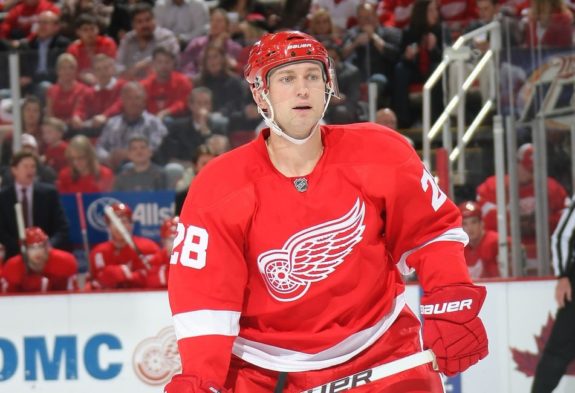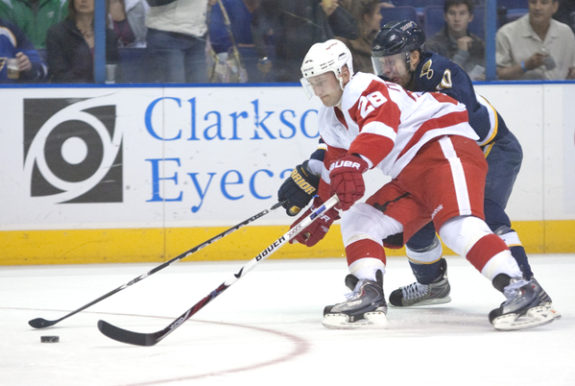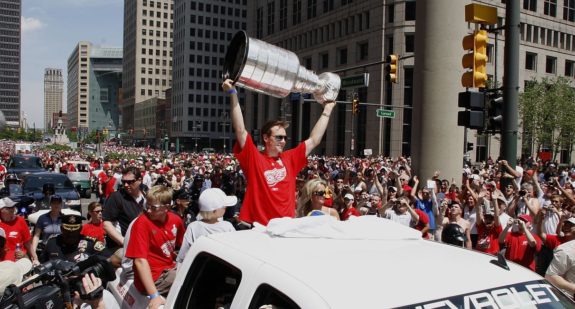When thinking about the best defensemen of the 2000s, Brian Rafalski is not one of the first names that come to mind. His junior career was turbulent, and his path to the NHL was an underdog story for the ages.
Despite that, and his unintimidating stature, Rafalski persevered. It is easy to brush his legacy aside, as he routinely played with an All-Star cast of defense partners with the New Jersey Devils and Detroit Red Wings. Nevertheless, his phenomenal offensive instincts and level-headed play impacted his teammates as much, if not more, than they influenced him.
Related: Detroit Red Wings – Complete 2020 Offseason Blueprint
He is one of the top two-way defensemen of his generation and thrived almost everywhere he played. Alas, before he became an NHL regular, he was just trying to get noticed.
An Undrafted Gem
Rafalski had minimal fanfare as a prospect in college. He posted steady results through his first three seasons with the Wisconsin Badgers in the NCAA, but his modest 5-foot-10 frame scared scouts away.

During the 1994-95 season, the 20-year-old blossomed, tallying 11 goals and 34 assists in 43 games, earning a selection as an NCAA First-Team All-Star. Despite the success, Rafalski did not receive any NHL offers, and after being passed over in the draft again, he decided to take his talents to Europe.
Rafalski, who was now 21 years old, initially joined Brynas in the Swedish Elite League for the 1995-96 season. Over the next three years, he moved to the top league in Finland and exceeded everyone’s expectations.
Related: Do You Know Your NHL Goalie Trivia?
In the 1998-99 season, playing for HIFK Helenski, the American rearguard was dominant. Rafalski tallied 13 goals and 34 assists in 53 regular-season games, as well as 14 points in 11 playoff games.
His performance won him the Kultainen Kypärä award, which is given to the league’s best player, as voted by his peers. Most notably, Rafalski was the first non-Finnish player in league history to earn the accomplishment.
Rafalski’s Deal with the Devils
Rafalski’s stellar season in Finland opened the eyes of several NHL teams, and the Devils were quick to strike. They signed Rafalski as a 26-year-old before the 1999-00 season, and he made an impact right away.
Playing predominately alongside Devils’ captain Scott Stevens, Rafalski netted 32 points and a plus-21 rating as a rookie. He was named to the NHL’s All-Rookie Team, and potted eight points in 23 playoff games en route to a Stanley Cup Championship.
Rafalski was even better in his sophomore campaign, tallying 52 points in the regular season to lead all Devils’ defensemen in scoring. His 18 points in 25 playoff games also led the team’s blueline, but the Devils fell to the Colorado Avalanche in Game 7 of the Cup Final.
Over the next five seasons, Rafalski averaged 45 points per year. He won another Stanley Cup with the Devils in the 2002-03 season. In 2006-07, his final season with the Devils, he set a new career-high with 55 points.
In terms of his place in franchise history among defensemen, Rafalski sits fourth all-time in regular-season points. Likewise, he is also the franchise leader for playoff power-play goals and playoff power-play points by a defenseman.
A Michigan Homecoming
Rafalski signed as a free agent with the Red Wings ahead of the 2007-08 season, as the team was trying to replace the hole created by Mathieu Schneider’s departure. Thankfully, Rafalski’s debut year went about as perfectly as possible. He formed a formidable defensive tandem with Nicklas Lidstrom, as the two developed noticeable chemistry.
Related: Top 10 Hockey Celebrations of All-Time
The Michigan native picked up an assist in his first game as a Red Wing, and followed that up with a power-play goal and assist in his second game. He appeared in 73 regular-season games, tallying 13 goals, 42 assists, 31 power-play points, and a plus-27 rating across 24:04 in ice time per game.

The team cruised to a 54-21-7 record, winning the Presidents’ Trophy in the process. Rafalski continued to be a factor once the postseason started, putting up 10 points through the first three rounds. He was held pointless by the Pittsburgh Penguins in the first three games of the Stanley Cup Final, but he saved his best for last.
Rafalski picked up at least one point in the last three games of the series, including a power-play goal in the Cup-clinching Game 6 victory. In his first season with the Red Wings, the team captured hockey’s ultimate prize.
Much remained the same heading into the 2008-09 season, and Rafalski picked up right where he left off. He soared to the best offensive season of his career with 59 points in 78 games. His exploits led him to a ninth-place finish in Norris Trophy voting.

An ailment in the playoffs forced Rafalski to miss five games in the second round, but he remained productive when healthy, posting 12 points in 18 games. The Red Wings faced off against the Penguins in the Cup Final yet again, but the injury-riddled team fell in Game 7, ending all hopes of back-to-back championships.
Related: 2012 NHL Draft Top 10 – Where Are They Now?
Despite the heartbreaking loss, Rafalski’s impact over his first two years with the Red Wings was apparent. The team posted a combined 136-53-20 record (regular season and playoffs) and looked dominant on most nights.
Rafalski would play two more seasons for the Red Wings, recording 90 points in 141 games over that span, but he retired at the age of 37 with chronic back and hip issues.
Rafalski’s International Excellence
While Rafalski enjoyed an esteemed NHL career, he was also a decorated Olympian for the United States. At the 2002 Winter Olympics in Salt Lake City, Rafalski tallied three points in six games to help Team USA capture the silver medal.
Rafalski also made Team USA at the 2006 Winter Olympics, but the entire team underwhelmed during a loss to Finland in the quarterfinals. Nevertheless, his performance at the 2010 Winter Olympics in Vancouver quickly made up for the lackluster tournament.
Rafalski was the highest-scoring defenseman in the tournament, netting eight points in six games. During the final game of round-robin play, his three-point performance against Team Canada ensured that Team USA would finish first in the group.
Team Canada eventually got the last laugh in the gold-medal game, but Rafalski’s brilliant showing did not go unnoticed. He was voted to the tournament All-Star team and was also named the best defenseman at the event.
His two Olympic silver medals, and a bronze medal from the 1992 World Junior Championships, earned him an induction to the United States Hockey Hall of Fame in 2014.
An Unheralded Star
Rafalski never won a Norris Trophy, and he was rarely the best defenseman on his team. Regardless, he showed up when it mattered most. He never missed the playoffs in his 11-year career, he participated in three NHL All-Star games, and he saw his name etched on the Stanley Cup on three separate occasions.
His 435 points between 2000-01 and 2009-10 were the third-most in the league by a defenseman during that span. Likewise, he is 20th all-time in playoff games played by a defenseman despite seeing his career cut short due to injuries.
Rafalski was a gifted puck-mover who made everyone around him better, and his international exploits for the United States only add to an impressive resumé. There is a legitimate argument to be made that Rafalski is the best free-agent signing in both Devils and Red Wings history. Not too bad for an undersized guy that went undrafted out of college.